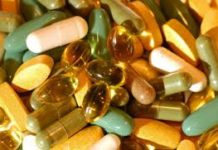Vitamin B-2, also known as Riboflavin, is an easily absorbed, water-soluble micronutrient with a key role in maintaining human health. Like the other B vitamins, riboflavin supports energy production by aiding in the metabolization of fats, carbohydrates and proteins. Vitamin B-2 is also required for red blood cell formation and respiration, antibody production, and for regulating human growth and reproduction. Riboflavin is known to alleviate eye fatigue, prevent and treat cataracts, increase energy levels, and aid in boosting immune system functions. It also plays a key role in maintaining healthy hair, skin and nails, and in combination with vitamin B-6, forms part of an effective treatment for carpal tunnel syndrome.
A deficiency of vitamin B-2 may be indicated by the appearance of cracks and sores at the corners of the mouth, a swollen and sore tongue, reddening of the lips, and the appearance of scaly, oily, inflamed skin. Use of oral contraceptives can dramatically increase the need for riboflavin, as does strenuous exercise. Pregnant women need to pay particular attention to assure they have adequate levels of B2 which are critical for the proper growth and development of the baby.
Foods high in vitamin B2 include beans, cheese, eggs, fish, meat, milk, poultry, spinach, and yogurt. In supplement form, B-2 is usually found in a complex combined with vitamins B-1, B-3, B-6, pantothenic acid, and folic acid.
Recommended Daily Intake for B2 is 1.2 mg. to 1.7 mg. per day. For pregnant women, the RDA is 1.6 mg per day, and 1.8 mg. per day for the first 6 months of nursing. RDA’s aside, the common doses available on the market range from 100 to 300 mg per day. There are no known toxic effects for B-2, but large doses can lead to tingling in the extremities and an increased sensitivity to sunlight.













